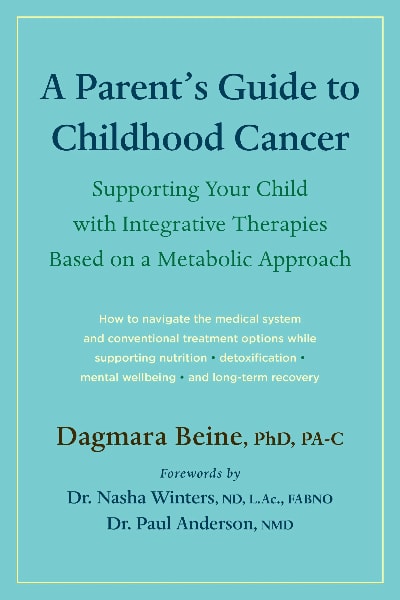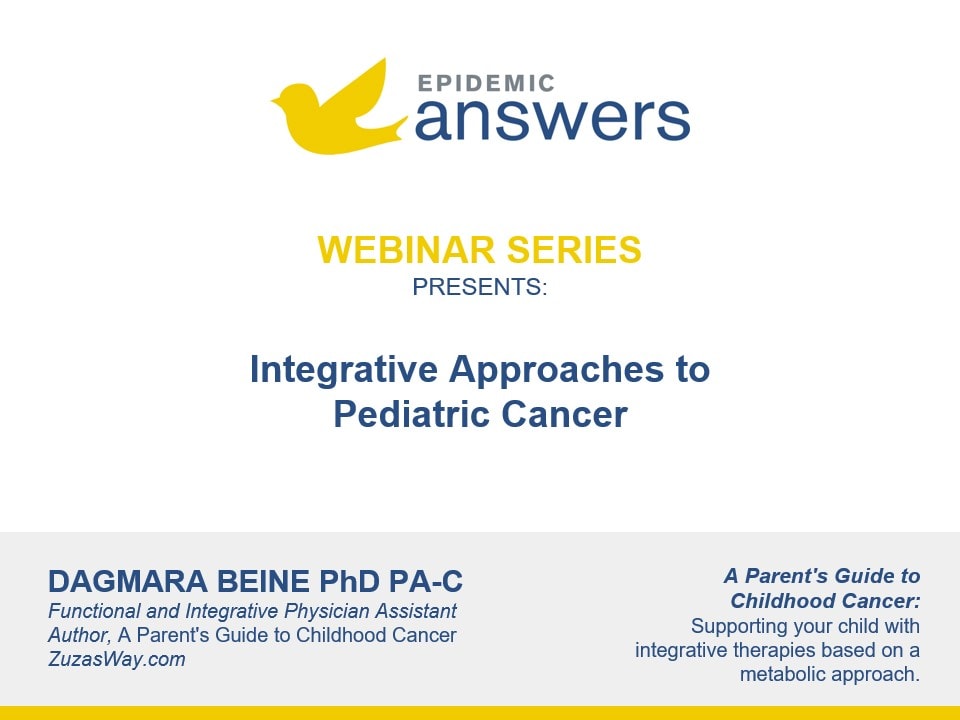The Metabolic Approach to Cancer was written with the goal of empowering cancer patients. One of the authors, Nasha Winters, is a decades-long survivor of end-stage ovarian cancer, with which she was diagnosed at the age of 19. Facing the possible end of her life as a newly minted adult, Dr. Winters quickly learned about integrative approaches to cancer including a traditional whole-foods diet and complementary medicine. These strategies are discussed in the book, and she is living proof of their potential efficacy.
What Causes Cancer?
A 2008 study, Cancer Is a Preventable Disease That Requires Major Lifestyle Changes, demonstrated that 90-95% of cancers can be attributed to unhealthy diet and lifestyle factors. In other words, your “DNA is not your destiny.” This statistic can be a motivating factor to patients that want to empower themselves to make these changes, and this is the goal of the book.
The writers state that “The root cause of cancer is actually damaged mitochondria.” While genetics can control the rate at which mitochondria can be damaged, it’s empowering to know that there are workarounds to DNA mutations such as the MTHFR mutation. (In this particular case, the workaround is eating leafy green vegetables and taking methylated B vitamins and other methylated supplements.) In addition, it’s empowering to know that mitigating and correcting lifestyle factors such as circadian rhythm, toxin exposure, sleep quality, movement, stress, microbiome imbalances and more can dramatically improve the body’s healing response.
Why the Metabolic Approach Is Key
The central thesis of the book is “Cancer is not a genetic disease but instead a metabolic disorder that occurs in response to how we are feeding and treating our bodies and therefore our genomes.” When cancer is looked at through this lens, it quickly becomes apparent that dietary changes are necessary. Because sugar feeds cancer (the Warburg effect), it follows that eliminating sugar and controlling blood glucose are paramount to halting cancer.
Fat cannot be used by cancer cells, so the ketogenic diet is a powerful diet for cancer patients to implement. By itself, it is not the cure for cancer, but it can help with stopping angiogenesis and controlling cachexia. To this day, we are still stunned by the fact that cancer-treatment centers often give their patients sugary treats. Winters and Kelley write that “low-glycemic, ketogenic diets and intermittent fasting should be an integral part of an effective anticancer diet program.”
What’s Included in the Book
It’s empowering to know that “Cancer treatment does not have to be ‘either-or’”. The metabolic approach can be used in conjunction with conventional treatments of surgery, chemotherapy and radiation. The ketogenic diet is not the only tool that can be used (and if you do choose to follow this diet, please work with a knowledgeable healthcare practitioner, such as one from the Metabolic Terrain Institute of Health, founded by Dr. Winters).
In addition to addressing some of the particulars about the ketogenic diet, the book includes a quiz to assess your Terrain Ten™ risk factors such as:
- Inflammation
- Blood circulation and angiogenesis
- Hormone balance
- Stress and biorhythms
- Mental and emotional health
Other information included in the book includes:
- Helpful lab tests such as HbA1C, fasting glucose, IGF-1, fasting insulin, fibrinogen, vascular endothelial growth factor (VEGF), serum copper, ceruloplasmin, ferritin and ketones
- An overview of common carcinogens and their exposure sources
- A guide to foods that can help with detoxification
- Therapies such as saunas, hyperthermia, mistletoe, forest bathing, hydrotherapy, grounding and Hyperbaric Oxygen Therapy (HBOT)
- Common nutrient deficiencies such as vitamins A, C and D, B vitamins, selenium, magnesium and zinc
- Common medications such as acetaminophen, antibiotics and acid-reflux remedies that can be contributing to immune dysregulation
- Immune-boosting foods such as medicinal mushrooms
- Debunking of common anti-cancer diets such as the Budwig diet, the acid-alkaline diet and the vegan diet
- Helpful antioxidant foods, supplements and spices
- Foods and culinary herbs that inhibit angiogenesis and metastasis
- Tips for cleaning out and restocking your kitchen
In Conclusion
If there is only one book that you buy to learn more about healing from cancer, we believe that The Metabolic Approach to Cancer should be your first choice. This book is an excellent reference for those empowered people who are willing to make the book’s recommended dietary and integrative changes. However, you should only make these changes with the help of your doctor and your other healthcare practitioners; it does not replace your relationship with them.
About Nasha Winters ND FABNO LAc
Dr. Nasha Winters is a global healthcare authority in integrative cancer care and research consulting with physicians around the world. She is the best-selling author of The Metabolic Approach to Cancer: Integrating Deep Nutrition, the Ketogenic Diet, and Nontoxic Bio-Individualized Therapies. She has educated hundreds of professionals in the clinical use of mistletoe and has created robust educational programs for both healthcare institutions and the public on incorporating vetted integrative therapies in cancer care to enhance outcomes.
Dr. Winters is currently focused on opening a comprehensive metabolic oncology hospital and research institute in the U.S. where the best that standard of care has to offer and the most advanced integrative therapies will be offered. This facility will be in a residential setting on a gorgeous campus against a backdrop of regenerative farming, EMF mitigation and retreat. You can find out more about her at her websites www.drnasha.com and https://mtih.org

About Jess Higgins Kelley MNT ONC
Jess is a Master Nutrition Therapist, Oncology Nutrition Consultant, teacher, writer, and nutrition education program developer. An Oncology Nutrition Consultant for over a decade, Jess has extensive experience working with cancer and chronic illness clients from around the globe.
She is also the co-author of two books, The Metabolic Approach to Cancer: Integrating Deep Nutrition, the Ketogenic Diet, and Nontoxic Bio-Individualized Therapies (Chelsea Green Publishing, May 2017) and Bioregulatory Medicine: An Innovative Holistic Approach to Self-Healing (Chelsea Green Publishing, November 2018).

Jess is the Founder and Director at the Oncology Nutrition Institute which provides online certification programs for professionals and education for the public in therapeutic metabolic nutrition. An avid researcher and student, Jess has completed certifications in Environmental Medicine through the University of Arizona Medical School, Nutrigenomics through Nutrition Genome, Endocrinology and Blood Chemistry Analysis through Apex Energetics, Scientific Phytotherapy through alchemlife, and Methylation and Clinical Nutrigenomics through Bastyr University. Jess was an instructor at the Nutrition Therapy Institute in Denver, Colorado from 2011-2017 and believes strongly in empowerment through education.
She holds a B.A. in Journalism from Western Colorado University and has written health and nutrition articles for a variety of local and national publications including Breast Cancer Wellness Magazine and is the former managing editor of Edible Southwest Magazine. Formerly a sea captain and lead Hurricane Island Outward Bound Instructor, Jess strongly believes in physical activity and spending as much time as possible outdoors connecting with nature. When not writing, teaching, or consulting with clients, Jess is trail running, skiing, surfing, sailing, doing yoga, gardening or spending time with her family. You can find out more about her work at her website https://www.remissionnutrition.com/
Still Looking for Answers?
Visit the Epidemic Answers Practitioner Directory to find a practitioner near you.
Join us inside our online membership community for parents, Healing Together, where you’ll find even more healing resources, expert guidance, and a community to support you every step of your child’s healing journey.
Sources & References
Accurso, A., et al. Dietary carbohydrate restriction in type 2 diabetes mellitus and metabolic syndrome: time for a critical appraisal. Nutr Metab (Lond). 2008 Apr 8:5:9.
Aggarwal, B.B., et al. Molecular targets of dietary agents for prevention and therapy of cancer. Biochem Pharmacol. 2006 May 14;71(10):1397-421.
Allen, B.G., et al. Ketogenic diets as an adjuvant cancer therapy: History and potential mechanism. Redox Biol. 2014:2:963-70.
Anand, P., et al. Cancer is a preventable disease that requires major lifestyle changes. Pharm Res. 2008 Sep;25(9):2097-116.
Bahr, L.S., et al. Ketogenic diet and fasting diet as Nutritional Approaches in Multiple Sclerosis (NAMS): protocol of a randomized controlled study. Trials. 2020 Jan 2;21(1):3.
Coller, H.A. Is cancer a metabolic disease? Am J Pathol. 2014 Jan;184(1):4-17.
Duan, W., et al. Hyperglycemia, a neglected factor during cancer progression. Biomed Res Int. 2014:2014:461917.
Giovannucci, E., et al. Diabetes and cancer: a consensus report. Diabetes Care. 2010 Jul;33(7):1674-85.
Labbé, D.P., et al. Role of diet in prostate cancer: the epigenetic link. Oncogene. 2015 Sep 3;34(36):4683-91.
Liu, H., et al. Refined fructose and cancer. Expert Opin Ther Targets. 2011 Sep;15(9):1049-59.
Lombardi, C., et al. Residential proximity to pesticide application as a risk factor for childhood central nervous system tumors. Environ Res. 2021 Jun;197:111078.
Lorenzi, M., et al. High glucose induces DNA damage in cultured human endothelial cells. J Clin Invest. 1986 Jan;77(1):322-5.
Onodera, Y., et al. Increased sugar uptake promotes oncogenesis via EPAC/RAP1 and O-GlcNAc pathways. J Clin Invest. 2014 Jan;124(1):367-84.
Seyfried, T.N. Cancer as a metabolic disease. Nutr Metab (Lond). 2010 Jan 27:7:7.
Seyfried, T.N. Cancer as a metabolic disease: implications for novel therapeutics. Carcinogenesis. 2014 Mar;35(3):515-27.
Seyfried, T.N., et al. Consideration of Ketogenic Metabolic Therapy as a Complementary or Alternative Approach for Managing Breast Cancer. Front Nutr. 2020 Mar 11:7:21.
Seyfried, T.N., et al. Is the restricted ketogenic diet a viable alternative to the standard of care for managing malignant brain cancer? Epilepsy Res. 2012 Jul;100(3):310-26.
Seyfried, T.N., et al. Metabolic management of brain cancer. Biochim Biophys Acta. 2011 Jun;1807(6):577-94.
Takano, T., et al. Glutamate release promotes growth of malignant gliomas. Nat Med. 2001 Sep;7(9):1010-5.
Tinkum, K.L., et al. Fasting protects mice from lethal DNA damage by promoting small intestinal epithelial stem cell survival. Proc Natl Acad Sci U S A. 2015 Dec 22;112(51):E7148-54.
Resources
Books
Beine, Dagmara. A Parent’s Guide to Childhood Cancer: Supporting Your Child with Integrative Therapies Based on a Metabolic Approach. Chelsea Green Publishing, 2024.
Bernstein, Richard K. Dr. Bernstein’s Diabetes Solution: The Complete Guide to Achieving Normal Blood Sugars. Little, Brown Spark, 2011.
Perro, Michelle MD, et al. What’s Making Our Children Sick?: How Industrial Food Is Causing an Epidemic of Chronic Illness, and What Parents (and Doctors) Can Do About It. Chelsea Green Publishing, 2017.
Seyfriend, Thomas. Cancer as a Metabolic Disease: On the Origin, Management, and Prevention of Cancer. Wiley, 2012.
Winters, Nasha. The Metabolic Approach to Cancer: Integrating Deep Nutrition, the Ketogenic Diet, and Nontoxic Bio-Individualized Therapies. Chelsea Green Publishing, 2017.
Websites
Dr. Bernstein’s Diabetes Solution
Metabolic Terrain Institute of Health




